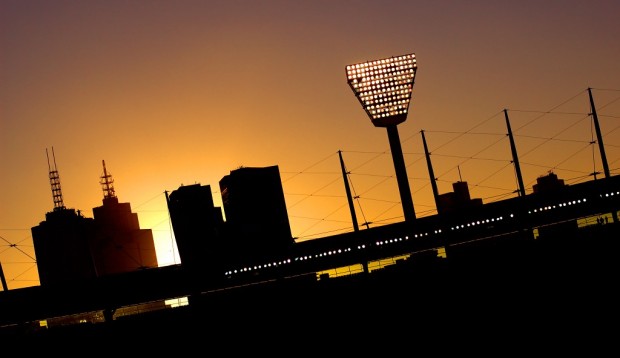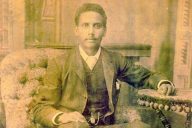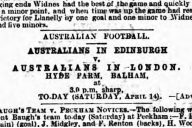There’s no such thing as a free lunch, but if someone else pays for it, it’s close enough.
I managed to score a free* ticket to Victoria University’s ‘Sport in Victoria – Who’s really winning?‘ forum, which is a good thing because the cost of a ticket to the entire thing would have set me back over $300. Movers and shakers from a range of sporting interests rocked up to discuss issues such as ‘Is Melbourne the world’s sporting capital?’, ‘Is it possible to win fair?’, and ‘Is hosting major sporting events worth the effort?’.
The forum was held last Thursday night and Friday, and was run out of the MCC, which was a great thing to keep in mind when people tried to hint towards the egalitarian and communal nature of Australian sport and avoiding trickle-down economics style solutions to our sporting problems.
Thursday night was a dinner thing, so lots of suits except for the odd western suburbs bum like me who turned up in jeans and a hoodie. Entree was some fancy poached chicken, main was some sort of meat that was, by my standards, still mooing, and dessert was some sort of attempt at a custard tart, and I had two of those because frankly I was still hungry after the other two courses.
Western Bulldogs president Peter Gordon, Committee for Melbourne CEO Kate Roffey, Ogilvy, Clayton, Cocking and Mead (something to do with golf) principal Mike Clayton and Rapid Ascent (some endurance thing) race director John Jacoby were on the panel for the dinner, discussing: “Is Melbourne the sporting capital of the world? As the world’s most liveable city, does Melbourne promote recreation and active living enough? Is promoting professional sport and community health in conflict or complementary?”
Peter Gordon aside, who made tremendous sense as well as being affable and charming, the rest kinda put me to sleep as we somehow sauntered into a discussion about whether Melbourne should bid to host another Olympic Games, and a debate from the floor with Australian Grand Prix chief Andrew Westacott about whether Formula 1 (and motorsport in general) was a sport or not.
My thoughts turned to this idiotic obsession of being the world’s most liveable city, when those metrics seem inherently to apply to the experiences of the people who live within the confines of the inner city. And as for active participation: Running? Jumping? Cycling? Swimming? How about getting people to walk more as a starting point? Why were the panelists (across both days) so obsessed with getting people into sports or activities that could be leveraged commercially?
While a rhetorical question, the opening session on Friday, “Major Events and The Economic Impact of Sport: Is this a key driver for the economy?” went some way to answering it.
It was chaired by Radek Sali, “you’ll feel better on” Swisse CEO, who also put forward what sounded like a ten minute sales pitch for his company, frequently using the irritating and almost meaningless buzzword ‘wellness’ (and by frequently I mean enough times that I noticed and became irritated by it, so at least twice). On the panel were Westacott, Tourism Australia managing director John O’Sullivan, Melbourne and Olympic Parks Trust CEO Brian Morris, and Professor John Madden of the Centre of Policy Studies, Victoria University.
Apart from Madden, I generally felt that the other three panelists tried to justify the existence of a major events oriented sporting direction. Madden went the other way, pointing out that realistically, hosting major sporting events (mostly referring to one-off things like the Olympics) doesn’t really boost economies – what it mostly does is redirect funding and investment into those areas necessary for hosting the relevant event, at the expense of other services and areas of the economy. Madden argued that theoretically there were ways of exacting a profit from such events with Melbourne advantaged by already having existing infrastructure; but he also hedged his bets, by adding that people were willing to pay a certain amount for intangible benefits, such as the prestige of hosting the event, increased national pride, etc.
Quite why an economist was talking about the intangibles, without even providing a method for accurately measuring them (and who knows how you would even start with something like that), I don’t know. But it did remind me of the words of a panelist at a public transport forum I went to last year, a PhD student who argued that governments the world over (in part due to the need to conform to the whims of the electoral cycle) seemed to become entranced with building expensive, flashy, big ticket items at the expense of smaller, incremental and more cost-effective improvements. For example a multi-billion dollar tunnel – whether for cars or trains – is a lot sexier electorally than say, ‘let’s improve rail signalling’. If the electorate keeps falling in love with these leviathan projects, and get taken in by the associated hype, then what can those who object do?
After morning tea, the next session was “Can You Win Fair? – Sport, Drugs, Ethics and Science”, with Richard Ings, the former chief executive officer and chairman, ASADA, David Grace QC, the president of Athletics Australia, associate professor Dennis Hemphill of the College of Sport and Exercise Science, Victoria University, and Caroline Wilson, AFL journalist, The Age. Since pretty much everyone in the room agreed that you can win fair, and that it’s ideal to win fair, the discussion turned to what we could do to stop cheating, and some people pointed out that too much money was the cause of the problem. Thankfully somebody pointed out the bleeding obvious – that people in sport cheat all the time, at all levels, at all ages. Success is the key motivator; money is sometimes a reward for that success, but not always.
I was disappointed that the discussion never really went in hard as to what is and isn’t classed as fair, and more importantly, just who gets to decide. The closest it seemed to come was the idea that fairness was a construct, but there was little in the way of why we cared so much for sporting fairness, when fairness in the rest of society is getting such short shrift (in my opinion; author and academic Michael Hyde also wondered out loud to me, why wasn’t anyone talking about class?), and why did we demand higher standards of fairness in sport than in other areas of public life? Why are sporting leagues allowed to, even encouraged to be run as cartels seeking evenness in competition, while the rhetoric about what kind of society we want as a whole goes the other way?
Because this session featured Caroline Wilson, it naturally threatened to turn into an Essendon saga special; unfortunately the fun police intervened, and thus the most interesting thing to happen at the conference got nipped in the bud – though you can read Samantha Lane’s version of events on that and the wider panel discussion here.
The lunch session (chicken and potato, walnut and date pudding with salted caramel – whatever happened to unsalted caramel?) also had a panel discussion, “The Way Forward for Victoria – Cause and Effect: Elite Sport or Community Participation?” with Geelong Football Club president Colin Carter, Rob Moodie, professor of Public Health from The University of Melbourne, Swimming Australia president John Bertrand, Netball Australia CEO and Victorian Institute of Sport chair Kate Palmer and John Wylie, the chair of the Australian Sports Commission.
The discussion, when it turned to the issue of getting kids to be more active obsessed on getting Physical Education and sport back into schools. The American example of playing sports in school, as opposed to with clubs, annoyed me. I was worried because the former is a bureaucratic response to a deeper problem. Why aren’t kids being active in their own spare time, of their own volition? You know, doing the things kids used to do because they wanted to do them – run, cycle, skip, hop, jump, kick a footy with their mates. Why do all these solutions focus on supervised and structured forms of increasing activity?
The American example comes with its idolisation of the teenage jock and concomitant ritual humiliation of the weak. What happened to be being active as a kid because it was fun? ‘Where are the parents?’ your correspondent shrilly cried.
The next session was going to be about the Olympics again, this time about our diminishing medal returns. I called it a day. There’s only so much angst over our Olympic performances that I can handle.
Checking the forum’s Twitter feed later on, Nicole Livingston seemed to make some good points about the Victorian situation in particular, especially how the AFL’s media dominance takes attention away from other sports (and not just women’s sports). But by that time I was at Newport station and completely jaded by the general thrust of the discussions, which rather than seeking to improve the sporting experience of Melburnians for the sake of it, was rather always on the lookout for a way to leverage it for a commercial gain of some sort – whether that was a corporate sponsor promoting their products, an event manager trying to explain why their event was really important for Melbourne (and worth the cost), or different sports trying to claim recreational participants as part of their own official fiefdom.
*The ticket was paid for by Victoria University, but the version of events as discussed above has nothing to do with them.
















